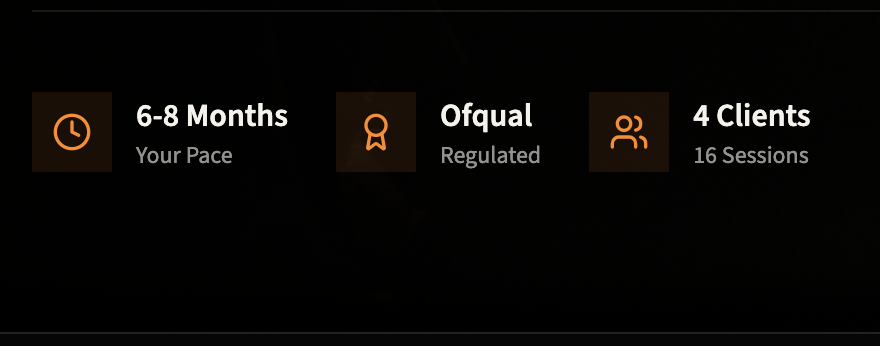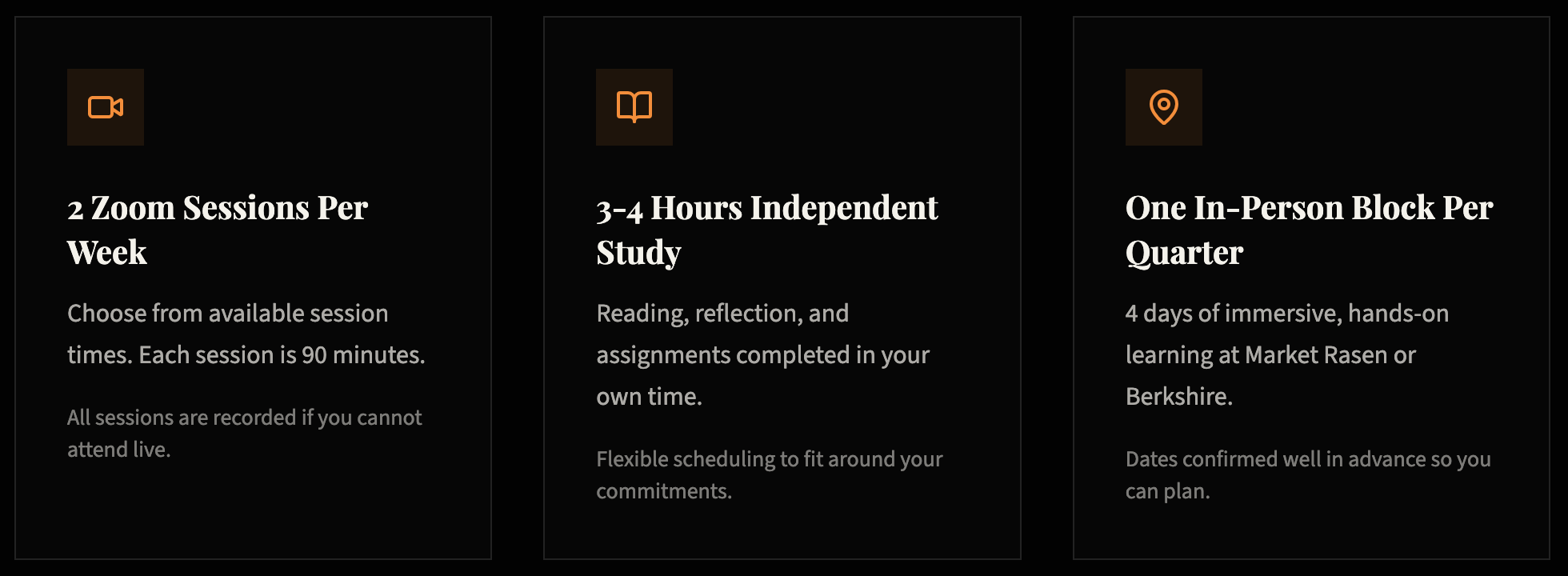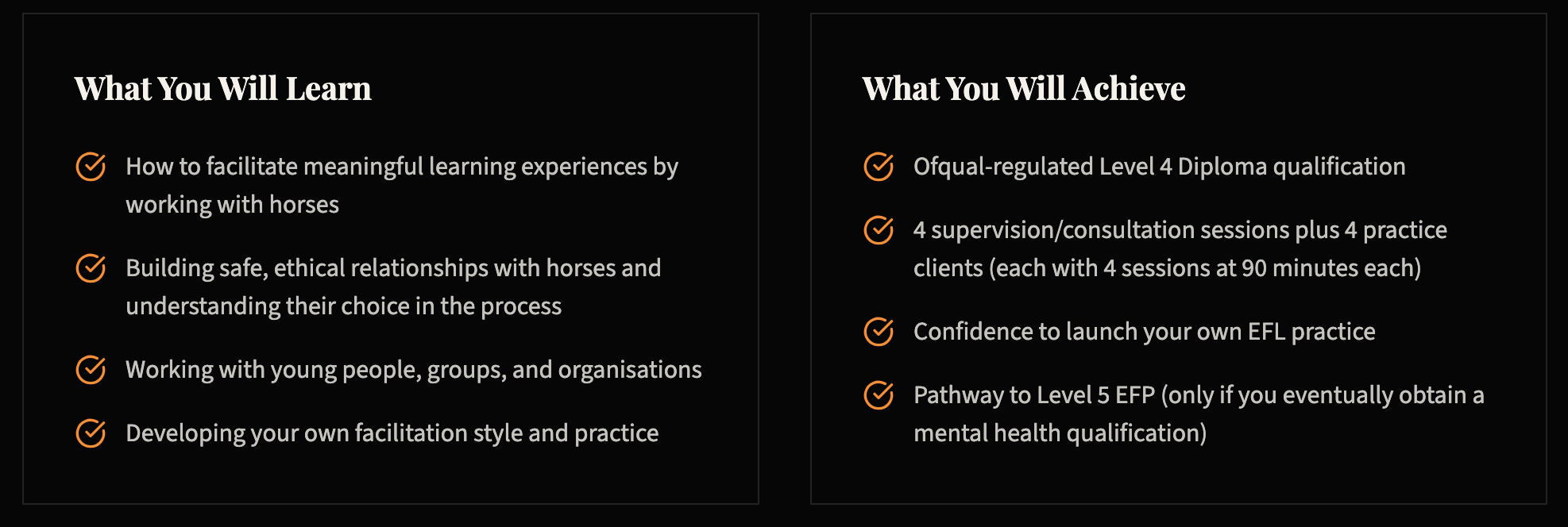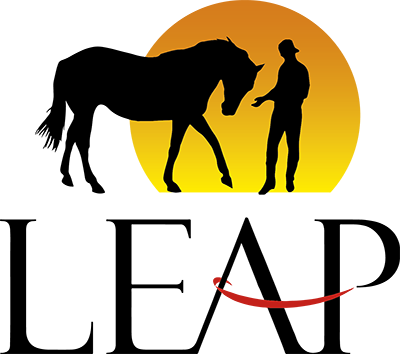Qualify as an EFL Practitioner in
6-8 Months
THE LEAP METHOD
Our blended learning programme is designed for working professionals and those wanting to work with equines. Start in spring and be ready to practice by September.
You will have access to the first 4 modules needed to complete Block 1 in-person experiential.

What does the time committment look like?
Here is how the hours break down:


Many learners complete this while working full-time or managing other commitments. The structure is built for that.
What Does The Course Entail?
The Level 4 Diploma in Equine Facilitated Learning prepares you to work with individuals and groups by working with horses as partners in the learning process. The course has 9 modules taught online and in person over a 6-8 month period of independent study, assignments, observational assessment, presentations, supervised practice, mentoring and independent learning between the blocks. The programme is designed for those who intend to pursue EFL (equine facilitated learning) as a career.
Your 6-8 Month Journey
-
Here is what your path looks like from start to finish

Throughout: Ethics and Professional Practice module, delivered solely online.
Bonus: Optional first aid training included at no extra cost.

Your Investment & Enrolment
Options
You've already seen the magic. Perhaps you've felt it yourself; the moment when something just seems to happen when you're in the presence of a horse. Clarity, connection, and transformation that cannot be rushed or replicated in a room.
This investment is not just in obtaining a qualification. It is in becoming the practitioner who can create that magic for others. It is in your future. It is in your dream...
Transformation cannot have a price. But access to the training that enables it can be made flexible.

8 mth PAYMENT PLAN
£906.25/mo (excl vat)*
*excludes Crossfields registration fee & VAT billed every month. Application fee paid separately.
Payment totals £1,161 per month. Payments can be spread out up to 10 months if needed. Timeline-dependent.
ONE TIME PAYMENT
£7250 (excl vat)*
* Single payment: £8928 (includes Crossfields registration fee & vat). Application fee paid separately.
6, 8, or 12 Months? You Decide
Some learners complete in 6 months. Others take 8. Some prefer 12. All paths lead to the same Ofqual-regulated qualification.
You are not locked into someone else's timeline.
Course Dates

Course Start Date: March (Material released online)
Introductory Zoom Call: Monthly until first in-person
In-Person Training Dates:
1st – 4th May 2026
Mid-July 2026
Additional Zoom Sessions: Weekly
Don't just take our word for it.
Here's what others say about EFL.

I have found the LEAP training to be inspiring, professional and comprehensive. As a result of taking the EFL course, I am continuing my studies to become a psychotherapist. It has improved my relationship with myself and my entire family! I would highly recommend the LEAP programme. My clients have experienced the life-changing magic of the horse, in a safe, supportive format.
- Rachel T.
(EFL 2019 Graduate)
&
(EFP 2022 Graduate)
My dream is to work in EFL/P - I love that LEAP values horses as Co-Facilitators.
-Saskia L.
(EFL 2024 Graduate)
I am now being my authentic self and I live my life's purpose everyday! I am part of a genuine community of committed professional who really care to create and support a better version of you and everyone in the community...Eternally grateful to LEAP for their support.
- Kylie M
(EFL 2018 Graduate)
Questions
Your Questions, Answered

Do I need experiences with horses?
While prior horse experience is helpful, it's not required. Our programme includes all the equine-specific training you need. What matters most is your commitment to learning and your passion for helping others.
What happens at the in-person blocks?
The two 4-day in person experiential blocks are immersive experiences at our Berkshire & Market Rasen centers. You'll work directly with horses, practise facilitation skills, receive feedback, and connect with your cohort. These are transformative experiences that deepen your learning significantly.
What's the difference between 6 and 8 months?
The timeline is learner-dependent. Some students complete in 6 months by maintaining a consistent pace, while others take 8 months to balance the programme with other commitments and practice clients. Both are valid paths to the same qualifications.
Can I progress to Level 5 EFP after complleting Level 4?
Yes! If you become a mental health professional, you can progress to become an EFP practitioner by the recognised prior learning pathway. This saves you time and money.

© Copyrights by LEAP Equine. All Rights Reserved.